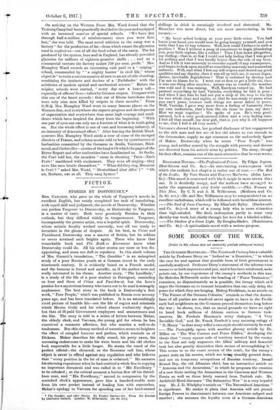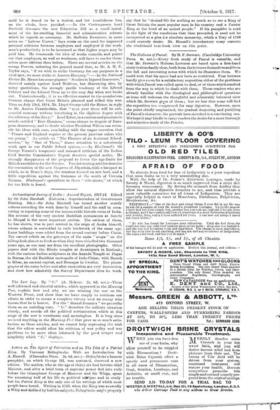SOME BOOKS OF THE WEEK.
UMW in This Mum does nog newt:gag preclude subtepant ream]
THE Ouronsa. MONTHLIEB.—The Nineteenth Century has a valuable article by Professor Dicey on "Ireland as 'a Dominion,' "in which the case for and against that possible form of Irish government is earefullyanalysed. Professor Dicey's statement of the adverse view seems to us both impressive and just, and it has been reinforced, as he points out, by our experience of the enemy's methods in this war. Sir Malcolm McIlwraith under the heading of "Furor Teutonicue " examines, as dispassionately as is possible, the frenzy which still urges the Germans on to commit brutalities that can only delay the peace for which they are longing. Bishop Frodsham, in an article on "The Future of the German Colonies" reminds us that tho Austra- lians of all parties are resolved never again to have in the Pacific such bad neighbours as the Garmans proved themselves long before tho war ; he shows, too, that on moral grounds we have no right to hand back millions of African natives to German task- masters. Mr. Frederic Harrison's witty dialogue, "A Very Invisible God," and Mr. Frank Newbolt's very amusing eulogy of "0. Henry "in that story-teller's own style should certainly be read. —The Fortnightly opens with another gloomy article by Dr. Dillon on "The War Current and Peace Eddies," developing the thesis that "every square mile of territory wrested by the enemy in the East not only augments the Allies' military and financial task but also greatly diminishes their means of accomplishing it." This seems to us the exact reverse of the truth, for the enemy's power rests on his armies, whirls are bring steadily ground down, and not on temporary occupations of Russian territory. Ismail Kemal Bey, the old Albanian chief, has an instructive article on " Armenia and the Armenians," in which he proposes the creation of a new State uniting the Armenians in the Caucasus and Western Persia as well as those lately rescued from Turkish rule. Mr. Archibald Hurd diecueses " The Submarine War "in a very hopeful way Mr. J. D. Whelpley's article on " The Naturalised American" is significant. He makes it plain that America will not permit foreign Powers to discriminate between one American subject and another ; he aseurnes the loyalty even of a German-American until he is found to be a traitor, and her trustfulness has, on the whole, been justified.—In the Contemporary Lord Sheffield diecusees the new Education Bill as a small instal- ment of the far-reaching financial and administrative reforms which he regards as necessary. Mr. Seebohn Rowntree, in some notes on "Labour Unrest," lays stress on the need for improved personal relations between employers and employed if the work- man's productivity is to be increased so that higher wages may be paid him. He commends the idea of works councils, and points out that employers, as well HS workmen, will have to render them- selves more efficient than before. There are several articles on the enemy Powers, enforcing the general moral that, as Mr. A. H. E. Taylor says, "if we wish to strike Germany for our purposes in a vital spot, we must strike at Austria-Hungary."—In the National Review Mr. Masse has some piquant Studies in Injured Innocence," directed mainly against Lord Haldane, but illustrating also, by many quotations, the strongly pacific tendency of the Liberal Cabinet and the Liberal Press up to the very day when war broke out. Unintentionally, it is an effective answer to the mendacious German charge that Great Britain planned and willed this war. Thus on July 23rd, 1914, Mr. Lloyd George told the House, in reply to Mr. Austen Chamberlain, that "next year there will be sub- stantial economy without interfering in the slightest degree with tire efficiency of the Navy." Lord Esher, in a curious and pessimistic ertiele entitled " Ecco nominee," seems almost to despair of Euro- pean democracy, and to doubt whether President Wilson can recon- cile his ideas with ours, concluding with the vague assertion that "France and England require at the present juncture rulers who are young." An article on "Tire Finance of an Assistant School- master," by "One of Them," draws attention to a notoriously weak spot in our Public School system.—In Blackwood's Sir George Forrest's temperate and reasoned criticism of the Indian Civil Service Commission's Report deserves special notice. He strongly disapproves of the proposal to lower the ago-limits for British candidates for the Service. Two interesting articles describe the coronation of the new Empress of Abyssinia, wills a banquet at width, as in Bruce's days, the warriors feasted on raw beef, and a little expedition against the Germans at the south of Victoria Nyanza. Blacknood's specializes in these "side-shows," of which far too little le heard.





























 Previous page
Previous page